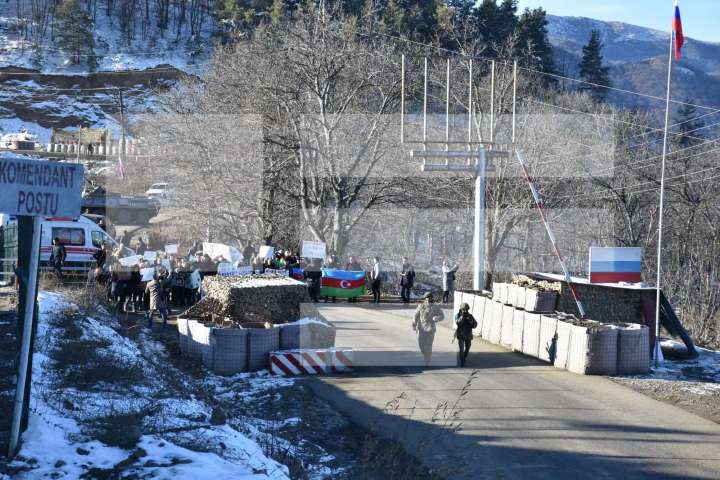As talks on a peace treaty between Armenia and Azerbaijan continue, Baku has set up a checkpoint in the Lachin Corridor, raising fears of renewed fighting, according to a new report by the International Crisis Group.
"There is a growing risk of new violence in and around Nagorno-Karabakh. On April 23, Baku installed a checkpoint in the Lachin Corridor on the highway crossing the Azerbaijani territory, the only road connecting Armenia to Nagorno-Karabakh. In May, at least three people were killed due to clashes between Azerbaijan and Armenia. Before Baku's establishment of the checkpoint, parallel diplomatic efforts had led to two draft peace agreements between the neighbors, one proposed by Russia and the other by the EU and the US.
Why did Baku set up the checkpoint?
According to the International Crisis Group report, Azerbaijan has long sought greater control over the road connecting Nagorno-Karabakh to Armenia. Hinting for years that such a step is expected, the President of Azerbaijan, Ilham Aliyev, announced in his February speech that he intends to carry it out.
"In response, Russia and Armenia declared their opposition. The de facto authorities of Nagorno-Karabakh warned that such a move would destabilize the situation. Armenia also rejected Baku's February proposal to establish border control points at the entrance to the Lachin Corridor, each on its side of the border. The proposal was seen as part of an Azerbaijani effort to legitimize control of the road and thereby violate the 2020 ceasefire agreement," the report said.
The report also notes that Baku appears to view the checkpoint as a way to assert control over territory that legally belongs to Azerbaijan but has been left out of its hands under the terms of the ceasefire, and which Baku now calls the "former Nagorno-Karabakh autonomous region."
How has Baku changed the status quo?
The International Crisis Group report details how on April 23, Azerbaijan began moving troops to the first Russian peacekeepers' observation post in Nagorno-Karabakh, just across the border with Armenia, where the Lachin Corridor begins. How a checkpoint was built in the next three days, and now Azerbaijani soldiers are checking people and vehicles entering and leaving the territory.
"As a result of the blockade, transportation has already become difficult. The ICRC informs that the transportation of people through them has been limited, and only Russian peacekeepers are allowed to transport people expecting medical assistance," the report says.
It is also noted that the checkpoint changes the status quo, according to which Russian peacekeeping forces regulated traffic through the Lachin Corridor.
By establishing a checkpoint, Baku continues the pattern, according to the Crisis Group report. Perhaps emboldened by Russia's full-scale war against Ukraine, with Moscow distracted and its military weaknesses exposed, Azerbaijan has taken several steps, including using force, to increase its military posture even as negotiations continue.
"Baku suspected that the Russian peacekeepers could not and would not prevent it from taking such steps. Since then, Russia has been unwilling or unable to prevent subsequent escalations, the blockade, and now Baku's creation of a checkpoint. Azerbaijan may also see the checkpoint as a haste for the departure of the Russian mission, whose initial mandate in Nagorno-Karabakh expires in November 2025. "Baku can give a signal that they will not need the services of peacekeepers from 2025, and maybe even earlier," the report says.
Why is this move worrisome?
The report states that the ethnic Armenians of Nagorno-Karabakh fear Azerbaijan will force them to leave the territory. "Baku reasserts control over Nagorno-Karabakh inhabited by Armenians. This move worries ethnic Armenians. Indeed, Azerbaijanis and Armenians have bitter memories of being forced to leave areas controlled by the other group due to conflict and fear of further bloodshed."
"Baku has justified its actions by pointing to the agreement under which Azerbaijan is responsible for the safety of people, vehicles, and cargo along the corridor. Its co-sponsors, Armenia and Russia, disagree with this interpretation, arguing that the ceasefire makes Russian peacekeepers responsible for the corridor. Baku seemed to accept this point until recently, although it also claimed that the peacekeepers were not performing their duties properly. Since installing its checkpoint, Baku has emphasized that it will maintain conditions for the "transparent, safe and orderly passage" of people, vehicles, and cargo through the checkpoint and coordinate with Russian peacekeepers who continue to patrol the corridor, the report said.
The new checkpoint threatens the peace between Armenia and Azerbaijan.
The International Crisis Group emphasized that the steps taken by Baku to reassert control put the peace process in doubt. Diplomats continue to demand cooperation with the de facto authorities of Stepanakert. From the Armenian point of view, the checkpoint sends a message that Baku is not serious about making compromises through negotiations and, instead, is ready to secure its interests by creating facts on the ground.
"Baku may counter that Azerbaijan participated in the US-brokered talks, but Baku's unilateral actions raise fears that it views the talks merely as a way to constrain Armenia and the de facto authorities rather than as a forum where it will make meaningful concessions. : If the two sides do not consider negotiations as a means by which they will resolve their disputes, there is the possibility of greater violence both in Nagorno-Karabakh and along the Armenian-Azerbaijani state border," the report said.
What has the international response been like?
The international crisis group also referred to the international reaction, stressing that the US. and France criticized Baku for creating the checkpoint. The US noted that the checkpoint "undermines efforts to establish confidence in the peace process." The French Foreign Ministry has adopted such a policy, warning that the checkpoint "endangers the negotiation process." Paris also called on Baku to take the temporary measures set by the International Court of Justice decision on February 22. The report mentions Washington's reaction, according to which the US is ready to take a stricter stance towards Baku, up to the point of applying sanctions.


















